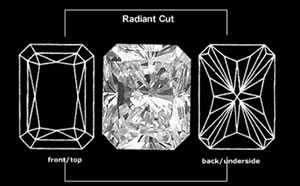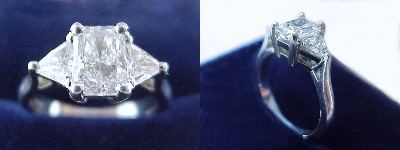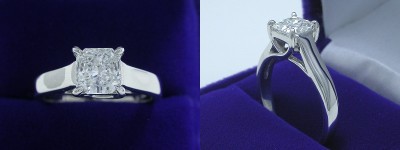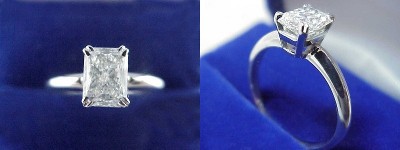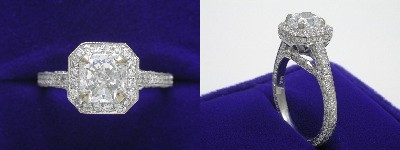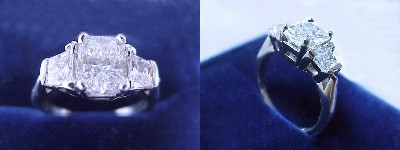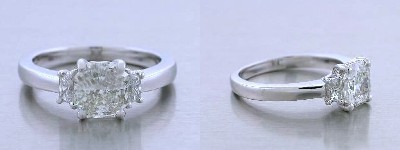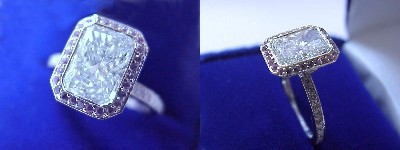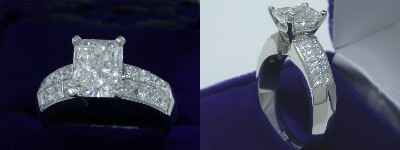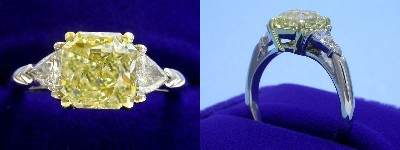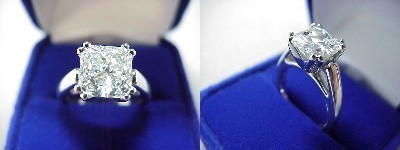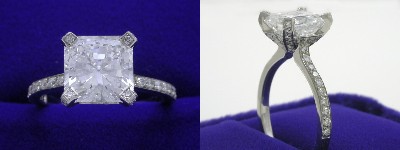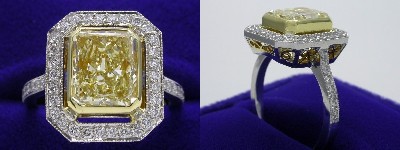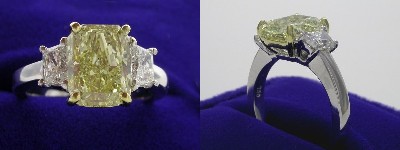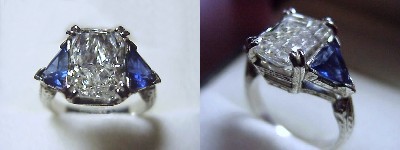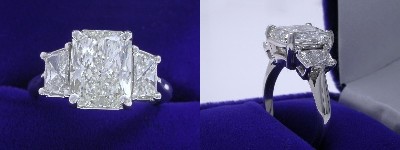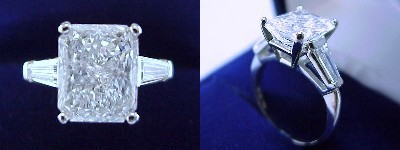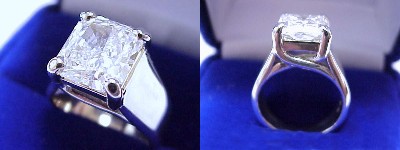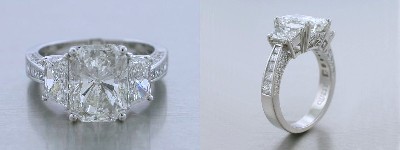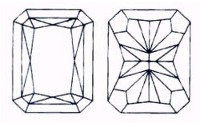 The radiant cut is the name used to describe the cut-cornered, rectangular or square modified brilliant, the technical description on GIA grading reports.
The radiant cut is the name used to describe the cut-cornered, rectangular or square modified brilliant, the technical description on GIA grading reports.
While some radiant cut diamonds have 70 facets (25 on the crown, 8 on the girdle and 37 on the pavilion), the most common facet pattern has 62 facets (25 on crown, 8 on the girdle, and 29 on the pavilion) as illustrated on diagram on the right. The truncated corners help to minimize chipping.
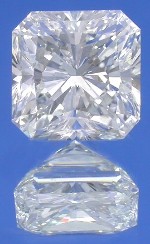 Radiant cut diamond is considered the father of branded fancy cut diamonds with a birth over 20 years ago. Originally protected by patent, the design is now public domain.
Radiant cut diamond is considered the father of branded fancy cut diamonds with a birth over 20 years ago. Originally protected by patent, the design is now public domain.
The radiant cut diamond is the first rectangular cut to have a complete brilliant facet pattern applied to both the crown and pavilion and as such presents a much more dazzling and brilliant diamond than the simple emerald cut.
Ten years ago the preferred length to width ratio was close to 1.5, the same as what was preferred for the emerald cut of the time. In recent years the popularity of the squarer shapes has let to length to width ratios of 1.2 to 1.3 being very popular. At the same time, square radiants (ratio 1.05 or less) have been a popular choice diamond shoppers looking for a very bright square diamond.
Radiant cut diamonds make exceptional center stones for three stone rings. Popular side stones include trillions, trapezoids, half moons and radiants.
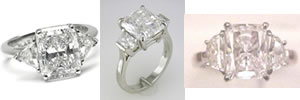
 In the rectangular radiant cut, as with marquise shapes and other elongated fancy shapes, there is an increased likelihood of having a “bow tie.” This is a dark area in the shape of a man’s bow tie that occurs when the angles of the cut are not optimum. This facet misalignment can detract from the brilliance, especially if it is an exaggerated or overly dark bow tie effect.
In the rectangular radiant cut, as with marquise shapes and other elongated fancy shapes, there is an increased likelihood of having a “bow tie.” This is a dark area in the shape of a man’s bow tie that occurs when the angles of the cut are not optimum. This facet misalignment can detract from the brilliance, especially if it is an exaggerated or overly dark bow tie effect.
Advice: We seek radiant cut diamonds with depth 58-69% and table 58-69%. We recommend at least I color and SI1 clarity for radiant cut diamonds.
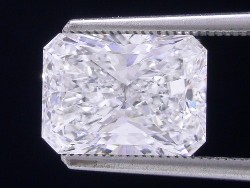 Rectangular shaped diamonds like the radiant cut differ from circles, like round diamonds. A circle is symmetrical but a rectangle is not. In round diamonds, depth percentage, crown height and pavilion depth are measured relative to the diameter of the diamond. Since the round diamond is circular, all diamonds with the same diameter have the same surface area.
Rectangular shaped diamonds like the radiant cut differ from circles, like round diamonds. A circle is symmetrical but a rectangle is not. In round diamonds, depth percentage, crown height and pavilion depth are measured relative to the diameter of the diamond. Since the round diamond is circular, all diamonds with the same diameter have the same surface area.
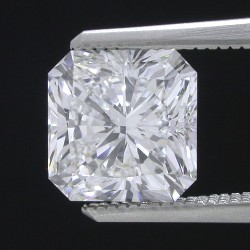 By comparison, all radiant cut diamonds with the same width do not have the same surface area. For example, a radiant cut diamond having a width of 5 mm and length of 7 mm has a surface area of 35 square millimeters. A radiant cut diamond with the same 5 mm width and a length of 5 mm has a surface area of 25 square millimeters. To maximize the beauty of each diamond, the radiant cut diamond with the greater surface area requires a greater depth percentage. The bottom line is that more rectangular radiant cut diamonds should have greater depth percentages than those that are closer to being square. The surface area example above is for illustrative purposes only since the actual surface area of a radiant cut diamond must take into account the loss of surface area due to the cut corners.
By comparison, all radiant cut diamonds with the same width do not have the same surface area. For example, a radiant cut diamond having a width of 5 mm and length of 7 mm has a surface area of 35 square millimeters. A radiant cut diamond with the same 5 mm width and a length of 5 mm has a surface area of 25 square millimeters. To maximize the beauty of each diamond, the radiant cut diamond with the greater surface area requires a greater depth percentage. The bottom line is that more rectangular radiant cut diamonds should have greater depth percentages than those that are closer to being square. The surface area example above is for illustrative purposes only since the actual surface area of a radiant cut diamond must take into account the loss of surface area due to the cut corners.
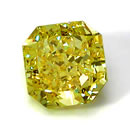 Radiant cut diamonds are especially popular for fancy-color diamonds because the shape, proportioning and facet arrangement intensify the color. Other diamond shapes tend to have lighter areas than others as the facet patterns do not show color evenly throughout the stone. The fancy color radiant cut diamonds usually have lower length-to-width ratios that are closer to a square than a rectangle.
Radiant cut diamonds are especially popular for fancy-color diamonds because the shape, proportioning and facet arrangement intensify the color. Other diamond shapes tend to have lighter areas than others as the facet patterns do not show color evenly throughout the stone. The fancy color radiant cut diamonds usually have lower length-to-width ratios that are closer to a square than a rectangle.
At Diamond Source of Virginia, we work with some of the most talented radiant diamond cutters in the world to provide breathtaking classic radiant cut diamonds for our clients at very low prices. If you are shopping for a beautiful radiant cut diamond that meets your specific requirements, give us a call today and we will find the best radiant cut diamonds available for you today.
The following photos are only a sampling of radiant brilliant cut diamond ring styles. Hundreds of mounting styles look great with radiant cut diamonds so just email us a picture of the style you like and we can get you a price quote. You can also check out our Designer Gallery for pictures of mountings from some of our suppliers.
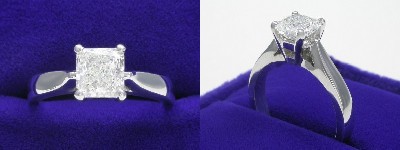
Radiant Cut Diamond Ring: 1.02 carat in Cathedral style mounting

